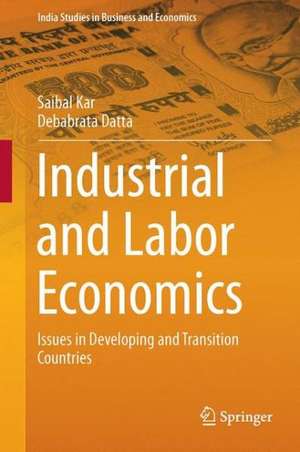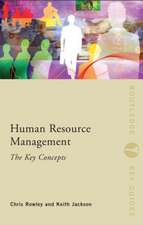Industrial and Labor Economics: Issues in Developing and Transition Countries: India Studies in Business and Economics, cartea 25
Autor Saibal Kar, Debabrata Dattaen Limba Engleză Hardback – 6 noi 2014
| Toate formatele și edițiile | Preț | Express |
|---|---|---|
| Paperback (1) | 381.43 lei 6-8 săpt. | |
| Springer India – 23 aug 2016 | 381.43 lei 6-8 săpt. | |
| Hardback (1) | 388.72 lei 6-8 săpt. | |
| Springer India – 6 noi 2014 | 388.72 lei 6-8 săpt. |
Din seria India Studies in Business and Economics
- 18%
 Preț: 897.65 lei
Preț: 897.65 lei -
 Preț: 361.78 lei
Preț: 361.78 lei - 18%
 Preț: 1006.24 lei
Preț: 1006.24 lei - 18%
 Preț: 952.89 lei
Preț: 952.89 lei - 20%
 Preț: 883.22 lei
Preț: 883.22 lei -
 Preț: 186.41 lei
Preț: 186.41 lei - 15%
 Preț: 636.94 lei
Preț: 636.94 lei - 15%
 Preț: 647.27 lei
Preț: 647.27 lei - 15%
 Preț: 646.30 lei
Preț: 646.30 lei -
 Preț: 409.89 lei
Preț: 409.89 lei -
 Preț: 372.98 lei
Preț: 372.98 lei -
 Preț: 389.88 lei
Preț: 389.88 lei - 18%
 Preț: 894.03 lei
Preț: 894.03 lei - 15%
 Preț: 644.30 lei
Preț: 644.30 lei - 15%
 Preț: 528.30 lei
Preț: 528.30 lei - 15%
 Preț: 643.65 lei
Preț: 643.65 lei - 15%
 Preț: 644.82 lei
Preț: 644.82 lei - 15%
 Preț: 660.37 lei
Preț: 660.37 lei -
 Preț: 386.00 lei
Preț: 386.00 lei - 20%
 Preț: 559.76 lei
Preț: 559.76 lei - 15%
 Preț: 643.99 lei
Preț: 643.99 lei -
 Preț: 386.68 lei
Preț: 386.68 lei -
 Preț: 390.08 lei
Preț: 390.08 lei -
 Preț: 365.76 lei
Preț: 365.76 lei -
 Preț: 393.52 lei
Preț: 393.52 lei - 15%
 Preț: 656.74 lei
Preț: 656.74 lei - 24%
 Preț: 699.24 lei
Preț: 699.24 lei -
 Preț: 369.80 lei
Preț: 369.80 lei - 15%
 Preț: 642.68 lei
Preț: 642.68 lei -
 Preț: 388.90 lei
Preț: 388.90 lei - 15%
 Preț: 649.87 lei
Preț: 649.87 lei - 15%
 Preț: 645.28 lei
Preț: 645.28 lei -
 Preț: 372.66 lei
Preț: 372.66 lei -
 Preț: 389.17 lei
Preț: 389.17 lei - 20%
 Preț: 569.00 lei
Preț: 569.00 lei - 15%
 Preț: 641.85 lei
Preț: 641.85 lei -
 Preț: 392.97 lei
Preț: 392.97 lei - 15%
 Preț: 643.84 lei
Preț: 643.84 lei - 24%
 Preț: 656.32 lei
Preț: 656.32 lei - 15%
 Preț: 651.34 lei
Preț: 651.34 lei - 15%
 Preț: 641.53 lei
Preț: 641.53 lei - 15%
 Preț: 640.37 lei
Preț: 640.37 lei - 20%
 Preț: 569.86 lei
Preț: 569.86 lei
Preț: 388.72 lei
Nou
Puncte Express: 583
Preț estimativ în valută:
74.38€ • 79.54$ • 62.02£
74.38€ • 79.54$ • 62.02£
Carte tipărită la comandă
Livrare economică 18 aprilie-02 mai
Preluare comenzi: 021 569.72.76
Specificații
ISBN-13: 9788132220169
ISBN-10: 8132220161
Pagini: 250
Ilustrații: XIV, 164 p. 32 illus., 16 illus. in color.
Dimensiuni: 155 x 235 x 17 mm
Greutate: 0.43 kg
Ediția:2015
Editura: Springer India
Colecția Springer
Seria India Studies in Business and Economics
Locul publicării:New Delhi, India
ISBN-10: 8132220161
Pagini: 250
Ilustrații: XIV, 164 p. 32 illus., 16 illus. in color.
Dimensiuni: 155 x 235 x 17 mm
Greutate: 0.43 kg
Ediția:2015
Editura: Springer India
Colecția Springer
Seria India Studies in Business and Economics
Locul publicării:New Delhi, India
Public țintă
GraduateCuprins
Chapter 1. The Dimensions of Labor Market in Developing and Transition Countries.- Chapter 2. Labor Markets in Developing and Transition Countries.- Chapter 3. Asymmetric Information in the Labor Market.- Chapter 4. Risk Sharing and Rent Sharing in the Labor Market.- Chapter 5. Industrial Organization and the Labor Market.- Chapter 6. Labor Unions: Concepts, Models and Public Policies.
Notă biografică
Saibal Kar is currently an associate professor of Economics at the Centre for Studies in Social Sciences Calcutta (CSSSC), India. He obtained his Master and Doctoral degrees in Economics from Calcutta University and Northern Illinois University, respectively. He has been a research fellow of the Alexander von Humboldt Foundation during 2008-09, a member of the Marie Curie Research Training Network on Transnationality of Migrants and is currently a Research Fellow of the Institute for the Study of Labor (IZA), Bonn. Dr. Kar has held visiting positions in Amsterdam School of Economics, Santa Fe Institute (NM, USA), Hamburgisches WeltWirtschaftsInstitut (Germany), United Nations University – World Institute for Development Economics Research (Finland) and University of East Anglia (UK), in recent years. He is the Managing Editor, South Asian Journal of Macroeconomics and Public Finance (Sage). He has received the Canada Asia-Pacific Research Award from the Department of Foreign Affairs and International Trade, Government of Canada. His research interests are broadly in the areas of labour economics, international economics and development economics. His research in labor economics focuses largely on immigration and occupational choice, human capital, risk aversion and asymmetric information in the labor market. His interests in the interface of international trade policies and labor economics include wage subsidy as a second best, trade reform and informal labor, trade and human capital, labor market reforms, productivity and risk sharing, etc. In the areas of development economics and public economics, he has addressed issues in public sector pays and corruption, political economy of public goods, corruption and informal sector, etc. His book The outsiders: Economic Reform and Informal Labour in a Developing Economy (with Sugata Marjit) has been published by the Oxford University Press, New Delhi in 2011 andTrade and Development (with Rajat Acharyya) by the Oxford University Press, UK in 2014 .
Debabrata Datta is currently a professor in Economics in Institute of Management Technology, Ghaziabad (India), with substantial research interest in the subject of industrial organization. He is also a Certified Associate of Indian Institute of Bankers. He obtained his PhD in Economics from the University of Calcutta. Having served in managerial capacity in Steel Authority of India Ltd. (SAIL) and State Bank of India (SBI), he has shifted to academics and has taught in several national universities. Furthermore, Dr. Datta has taught and researched at the University of Copenhagen (Denmark) and Lancaster University (UK). He has recently published in journal such as International Game Theory Review, Manchester School, etc. He regularly contributes to public policy discourse in various forums.
Debabrata Datta is currently a professor in Economics in Institute of Management Technology, Ghaziabad (India), with substantial research interest in the subject of industrial organization. He is also a Certified Associate of Indian Institute of Bankers. He obtained his PhD in Economics from the University of Calcutta. Having served in managerial capacity in Steel Authority of India Ltd. (SAIL) and State Bank of India (SBI), he has shifted to academics and has taught in several national universities. Furthermore, Dr. Datta has taught and researched at the University of Copenhagen (Denmark) and Lancaster University (UK). He has recently published in journal such as International Game Theory Review, Manchester School, etc. He regularly contributes to public policy discourse in various forums.
Textul de pe ultima copertă
This book is an attempt to capture and analyze several idiosyncratic features of industry and labor in the developing world. Available books and graduate-level texts in labor economics largely discuss industrial and labor market situations prevalent in developed countries, where well-defined institutional arrangements and regulations create a very different scope of analysis. The patterns of choice in training and contracts in the labor market more apparent in developing and transition countries are discussed, as are the information-theoretic results. The book also critically examines labor migration, a context in which the developing and transition countries represent large sources in the present global order. A broad base of empirical observations from industries is used to develop analytical conjectures on risk-sharing arrangements between workers and employers, while strong intuitive explanations are combined with relevant mathematical and graphical derivations, ensuring the book’s readability among graduate students pursuing courses in labor economics and industrial economics for developing and transition countries. The book may also serve as a valuable reference guide for all students in advanced human resources courses at management schools. Presenting state-of-the art research findings in all of its chapters, the book discusses numerous institutional peculiarities of the developing world, making the results distinct in view of the general scope of labor economics.
Caracteristici
Bridges the gap between advanced topics in labor economics and human resource management Discusses those labor and industrial issues that are most pertinent to developing and emerging market economies Gives new directions for further analytical and empirical research, including new perspectives on risk-sharing arrangements between workers and employers Includes supplementary material: sn.pub/extras









